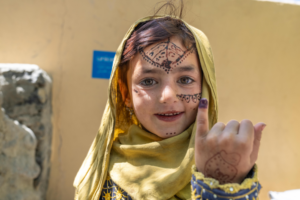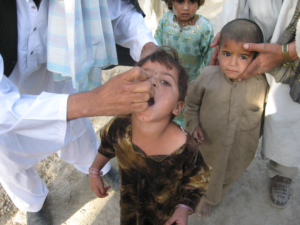by Maryanne Buechner
First published February 13, 2025 by UNICEF

A nationwide immunization campaign backed by UNICEF and partners kicked off in February in Pakistan, one of the last two countries where wild poliovirus remains endemic. Efforts are focused on reaching every unvaccinated child under 5.
A lifetime of protection from a highly infectious disease
Pakistan’s first nationwide polio campaign of 2025 launched the first week of February, aiming to vaccinate over 45.4 million children under the age of 5 in 159 of the country’s 166 districts.

More than 400,000 frontline workers are going house to house to make sure all children under age 5 are reached. Two doses of the oral polio vaccine provides lifetime protection against the highly infectious disease. Before vaccines were available, hundreds of thousands of children were left paralyzed by polio annually.
Today, with the number of cases down by over 99 percent, polio eradication is within reach.
Pakistan and Afghanistan are the only two countries where wild poliovirus remains endemic. In both countries, community health and other frontline workers play a crucial role in reaching the finish line.

Working closely with communities, parents, teachers, religious leaders to build lasting trust in vaccines
In Pakistan, frontline workers are especially focused on addressing misinformation about vaccines while communicating the importance of vaccination as the key to eradication.
Campaign strategies are tailored to specific populations, and informed by initiatives such as The Listening Project — a collaboration with female frontline health workers — and a nomad vaccination initiative, which deploys mobile teams to ensure children of nomadic families aren’t left behind. Rotary International, a founding partner in the Global Polio Eradication Initiative, has organized workshops with local religious leaders to help secure their support.
Rotary also supported the installation of solar-powered water systems in nearly two dozen high-risk communities. Upgrading a community’s water and sanitation system not only helps stop the transmission of the poliovirus through fecal-contaminated water, it also prevents the spread of other diseases such as cholera, while making the community — and an essential service children and families rely on — more climate resilient.
“Thanks to the unwavering dedication of our health workers, volunteers and global partners, we are turning the tide,” said Aziz Memon, who serves as Pakistan National Committee Chair for PolioPlus, Rotary’s program that provides communities with benefits beyond vaccination, including safe water and other medical treatments.
“The progress we see today is not just in numbers — it is in healthier children, stronger communities and the growing confidence that we will achieve a polio-free Pakistan,” Memon said. “We are determined, we are resilient and we will not stop until we have delivered on our promise of a polio-free future for every child.”
Learn more about global efforts to eradicate polio once and for all and how to support this mission.
Every year, UNICEF procures and distributes vaccines to immunize 45 percent of the world’s children. Learn more about UNICEF’s work in child immunization.
Related Articles

Closing the Gap: The Afghan Women Gaining Ground Against Vaccine Refusals and Zero Dose Children
Across Afghanistan, community advocacy to increase vaccine uptake for polio and other deadly diseases has some unsung champions: the local women. From the Global Polio Eradication Initiative and UNICEF.

Frontline Workers Lead the Charge in Polio’s Final Stand
The Global Polio Eradication Initiative has made remarkable progress in eliminating polio, with frontline workers playing a crucial role.
